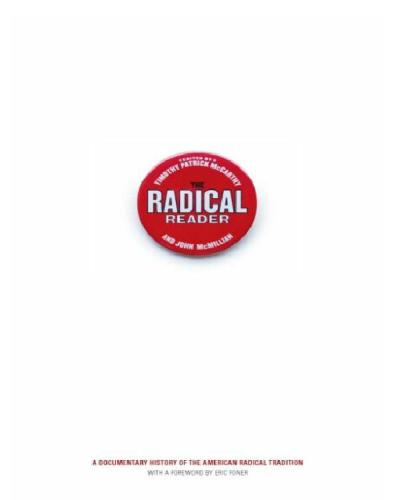
The Radical Reader
A Documentary History of the American Radical Tradition
کتاب های مرتبط
- اطلاعات
- نقد و بررسی
- دیدگاه کاربران
نقد و بررسی

August 1, 2003
It's bracing to be reminded that the American experiment was radical at its inception--that in their own day the founding fathers (and mothers) were not hallowed figures but revolutionaries charting a new political path. Thus, among the 155 entries selected by two Harvard academics, are the 1765 Resolutions of the Stamp Act Congress and the Bill of Rights. Also here are crucial documents from the abolitionist movement (such as Frederick Douglass's"What to the Slave Is the Fourth of July?"); feminist texts, from Sarah Grimke's Letters on the Equality of the Sexes to the 19th Amendment giving women the vote; texts of the 60s counterculture, from Allen Ginsberg's"Howl" to a Weathermen brochure; and the volume ends in the immediate past with a 2002 open letter by academics opposing the invasion of Iraq. Each entry is preceded by a brief introduction providing historical and biographical context."By definition, radicals are a minority," writes historian Eric Foner in his foreword. Members of the newest left, whether antiwar or anti-globalization, will find a sense of roots and tradition in this comprehensive anthology.

October 1, 2003
For this collection, McCarthy and McMillian (both history & literature, Harvard) selected more than 200 primary documents representing American progressive radical traditions. Arranged under "Abolitionism," "Suffrage and Feminism," "Land and Labor," "New Negro to Black Power," "New Left and Counterculture," "Modern Feminism," "Radical Environmentalism," and "Queer Liberation," among other categories, the letters, speeches, editorials, and documents (e.g., the Bill of Rights) showcase the ideas of Phillis Wheatley, Mark Twain, Black Elk, Rachel Carson, Aaron McGruder, and others who worked within radical traditions to advance the ideals of "freedom, equality, justice, and opportunity." Each document is accompanied by the title of its source, selected readings, and a brief introductory paragraph with biographical and historical information. An index would have helped, but by bringing many hard-to-find documents under one cover, this anthology will excite readers in discussing why radicals from all walks of life have made progressive ideals meaningful to Americans. Recommended for college, high school, and public libraries.-Charles L. Lumpkins, Pennsylvania State Univ., State College
Copyright 2003 Library Journal, LLC Used with permission.

July 1, 2003
Progressive radicalism, the array of traditions that "seeks to expand existing definitions of freedom, equality, justice, and opportunity," is intrinsic to American society and essential to democracy. From the revolution that gave birth to our nation to abolitionism, the labor movement, suffrage and feminism, civil rights, gay liberation, and environmentalism, radicalism has been responsible for maintaining the freedoms guaranteed in the Constitution, and for ensuring that quality of life and justice aren't forfeited in the pursuit of wealth and power. Two Harvard-based historians explicate and encapsulate the rich and vital spectrum of American radicalism by presenting more than 200 declarations, appeals, editorials, and essays by such radical thinkers (each introduced in a brief bio) as Frederick Douglass, Sarah Grimke, Henry David Thoreau, Upton Sinclair, Emma Goldman, Angela Davis, Betty Friedan, Mario Savio, Cesar Chavez, Rachel Carson, Tony Kushner, and Ralph Nader. The result is proof-positive that the U.S. has always been "a protest nation," a society of necessary sacrifice and tremendous achievement, and every citizen should hope that it remains so.(Reprinted with permission of Booklist, copyright 2003, American Library Association.)

























دیدگاه کاربران